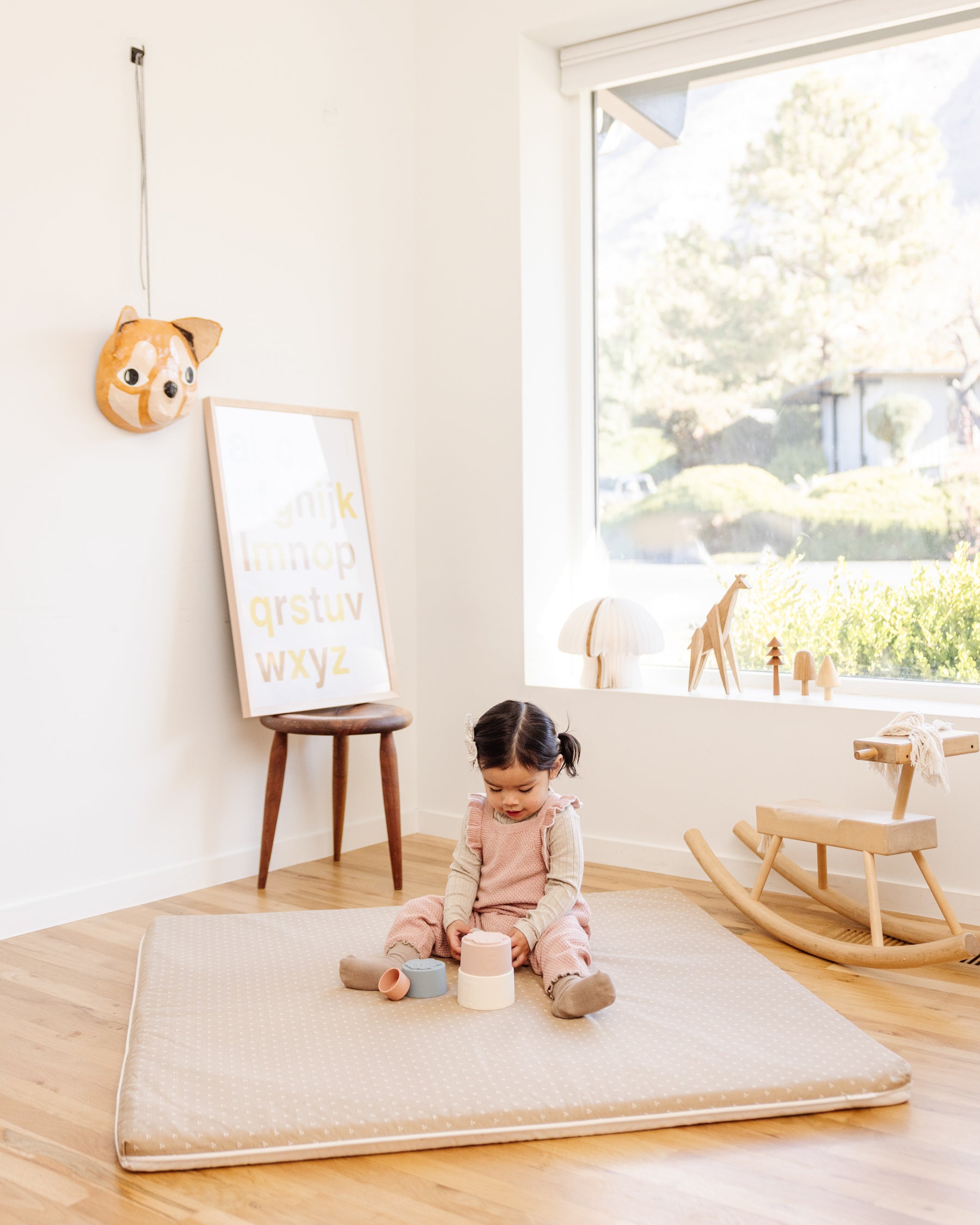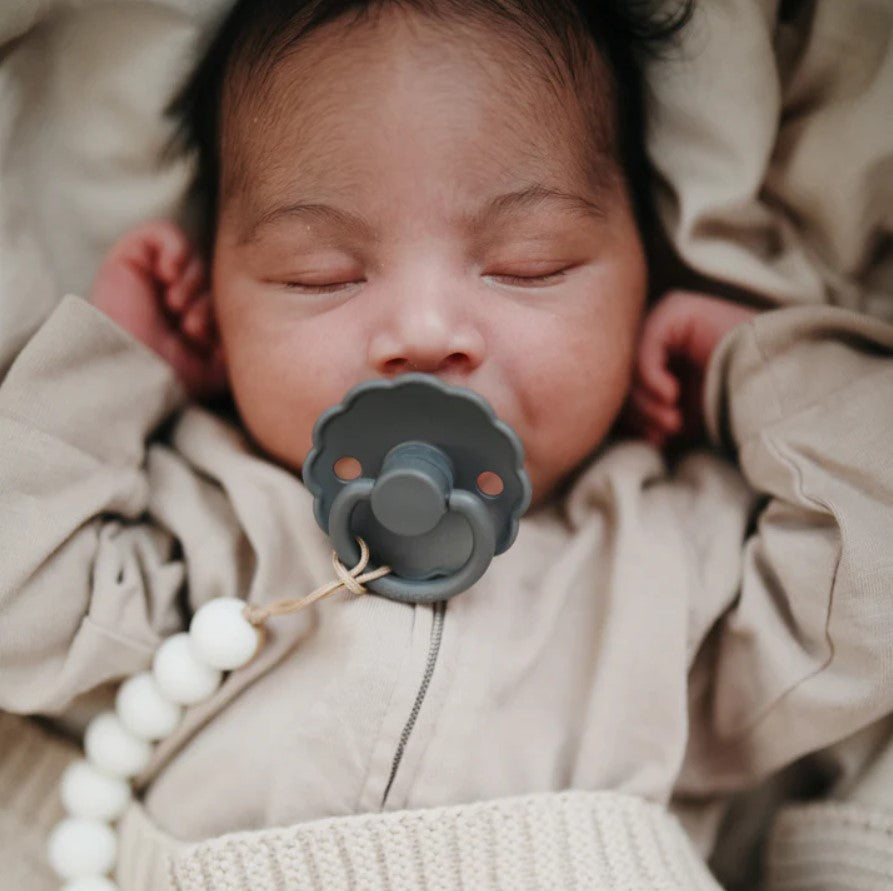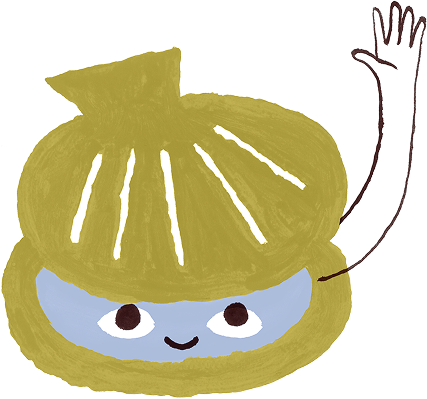Sleep deprivation for parents in the first year of their baby's life is a nearly universal experience. Among the top concerns for new parents is when their baby will sleep through the night. Not all countries manage infant sleep like we do in the United States.
My Guatemalan inlaws have a different approach to taking care of babies, including sleep. Raising my three children with ideas from American and Guatemalan cultures has shaped my perspective on newborn sleep. This unique blend of cultures has also helped me have an open mind.
Newborn Sleep Patterns
Newborn sleep patterns vary greatly. According to the NHS, infants may sleep as little as 8 hours during a 24 hour period. Other infants may sleep 18 hours.
When we interviewed Dr. Daur, a pediatrician and mom, about infant sleep, she confirmed that "It is a learned skill. Some babies have a natural ability to sleep better and easier than other babies."
Some babies simply sleep well, and others take time to learn. I can confirm this personally as a mother to three. As infants, my boys tended to wake up a lot, while my daughter slept for hours at night.
Experts at Stanford explain that babies typically wake up at least every three hours during the first few months of life. This is in part because babies have tiny tummies and need to eat often.
Why Newborns Struggle with Sleep
Maria Montessori referred to the first year of life as the "fourth trimester." She called it this because babies are dependent on their caregivers completely. Also, during this time, babies are just learning to live outside the womb.
Naturally, they want to be close to their mother or another caregiver. Newborns often fall asleep in a caregiver's arms, as they feel relaxed being held. Some cultures, including Guatemala, welcome and accept this. There, it is common to see women carrying sleeping babies on their backs as they cook, clean, or work in the fields.
One way parents can recreate the feeling of security for newborns is with a swaddle. Swaddling is generally safe for babies that are 2 months old or younger. Research shows that swaddling can increase infant sleep duration.
Another issue parents face is that newborns don't yet differentiate between day and night. This means your baby's body doesn't associate night-time with sleep. It can help to make sure your baby gets natural sunlight in the mornings.
Also, infants can't produce their own melatonin, an important sleep hormone, until they are three months old. Breastfed infants get melatonin through breast milk. However, you can help your baby develop a rhythm and routine by exposing them to sunlight during the day.

What Does it Mean to "Sleep Through the Night"?
Expectations vary greatly about what it means to "sleep through the night." Some studies define sleeping through the night as sleeping from 12 am to 5 am. Others define it as sleeping for 6 or 8 consecutive hours.
The same study shows that even infants who sleep through the night at 6 months might not continue to do so at 12 months.
Global Approaches to Infant Sleep
Culturally, there is also a wide range of expectations related to sleep. While some countries in the world send their babies to bed early, others allow them to stay up late.
In New Zealand, it's common for infants and toddlers to go to bed around 7:30 pm. Similarly, children go to bed at 6:30 or 7 pm in the Netherlands. However, in both Hong Kong and Spain, young children often don't go to bed until after 10 pm.
In Guatemala, families tend to let babies set the schedule. Babies fall asleep when they're tired and parents put them down. However, if babies are awake, parents usually do not try to make them sleep before they are ready.
A wide range of practices also exist related to infant sleeping arrangements. When my daughter was about 1 year old, we put her on a floor bed in another room.
Previously, we had room-shared. At one year old, preferred her space, peace, and quiet. My mother-in-law was very concerned about this, worrying that she would be lonely.
In Guatemala, most babies co-sleep with their parents. People consider it cruel to expect babies to sleep alone in their crib, let alone in another room.
The BBC also reported that the way we sleep now, for 8 consecutive hours and generally alone, is new. Even for adults, sleeping for a long, sustained period is a new practice. The natural question then, is why do we expect infants to sleep through the night?
The Importance of Night-Wakings
Researchers now understand that night-wakings play an important role in infant sleep. While inconvenient, night wakings may help prevent SIDS (Sudden Infant Death Syndrome).
Infants may awaken when they sense their oxygen levels dropping, and sigh or thrash. This can help them change positions and avoid asphyxiation. Simply waking can also change brain activity.

Parent-Led Vs. Infant-Led Routines
Many parents try to create routines for their babies, which is often easier said than done. Parents may try to put their babies down for a nap or night-time sleep on a rigid schedule.
Research shows that parent-led routines are associated with higher levels of anxiety for mothers. Following the infant's sleep and hunger cues may be easier on the parent's mental health.
This approach is also what our ancestors did for centuries before modern expectations about sleep arose. Many cultures today continue to follow their baby's schedule.
Newborns are just learning to live outside the comforts of their mothers' womb. It takes them a while to adjust to the rhythms of day and night. Babies also wake up at night because of their natural reflexes and frequent hunger.
It takes time for babies to adjust to and be able to follow a routine. Sleeping for long stretches may not be developmentally possible until babies are at least 3 or 4 months old. That said, research also shows that babies have variable patterns of sleep. Babies may sleep through the night for a few nights and then start waking up again.
The good news is that sleep for babies and mothers gets better, with a marked improvement at around 12 months of age. If you and your newborn are experiencing sleep difficulties, it is likely that you will soon enjoy more restful nights.
How to Help Your Baby Sleep Through the Night
While research shows babies inevitably wake up during the night, there is hope. Discover some strategies that can help your baby (and you!) get more sleep.
Increase Time Between Feedings: One research-backed way to increase the amount of time baby sleeps is by increasing time between feedings. In one study, parents offered the last feed between 10 PM and 12 AM. Then, parents used alternative methods of care such as swaddling, changing a diaper, or rocking.
Over time, infants slept for longer intervals. If you're breastfeeding, one thing that can help is to have your partner attend to the baby between feeds. This can help your baby sleep for longer periods without feeding. Over time, everyone gets more sleep.
Possums Sleep Program: Developed by Dr. Pam Douglas, the Possums Sleep Program helps parents work with their child's biology for better outcomes. A major component of the program is helping parents adjust expectations. When parents understand that night-time wakings are normal, it can help adjust their approach.
This program also recommends letting napping happen on the go instead of expecting routine day-time sleeps. For example, your baby might fall asleep in the car on the way home from the grocery store. Or, your baby might take a nap after a busy morning out.
3 Month Old Sleep Schedule
A 3-month old baby may sleep between 8 and 18 hours a day. Generally, infants who are 3 months old don't sleep through the night.
A typical schedule for a 3-month-old includes sleeping after feedings and sleeping for 3 to 4-hour periods at night. Most 3-month-olds wake up for night feeds several times during the night.
Providing plenty of stimulation during the day, including tummy time, can help your baby sleep well.
4 Month Old Sleep Schedule
Around 4 months of age, your baby may start having a more regular sleep cycle. They may sleep for slightly longer stretches at night. Some babies may even sleep for 8 hours. 4-month-old babies also tend to nap throughout the day, taking at least one morning and one afternoon nap.

1 Year Old Sleep Schedule
By the time your baby has their first birthday, they are likely to sleep through most of the night. During the day, they have longer wake windows and may only nap once or twice a day.
Most 1-year-olds need to sleep between about 11 and 14 hours per 24-hour period. Each child has their own preference and routine. Some 1-year-olds may have both morning and afternoon naps and 10-hour night. Others may skip their morning nap and have a longer afternoon nap.
At 1-year-old, your baby can benefit greatly from a bedtime routine that helps their body prepare for bed. A bath and storytime can help your baby settle down for a good night's sleep.
When Do Breastfed Babies Sleep Through the Night
Breastfeeding is a wonderful gift. Yet, breastfed babies often feed more frequently than formula-fed babies. This is because breastmilk is typically easier to digest for infants. That means your baby will get hungry faster than a baby who is formula-fed. This may also affect your baby's sleep, as many babies wake up hungry at night.
Fortunately, breastmilk also contains helpful sleep hormones that make both you and your baby sleepy. This can cancel out the effects of more frequent feedings for breastfed infants.
Research shows that both breastfed and formula-fed babies have the same frequency of night wakings. Many babies start sleeping for longer stretches as they grow older. At 6 months, many babies sleep through the night, while others may take until 1 year of age to sleep through the night.
If you need to change your baby's diaper at night, consider changing it before feeding your baby. Babies often fall asleep while feeding, meaning changing their diaper afterward may wake them up.
What to Do if Your Newborn Won't Sleep
Sometimes, a medical issue such as reflux or discomfort keeps your baby from sleeping. If your baby seems especially fussy, be sure to let your pediatrician know.
Also, keep in mind that babies often have trouble sleeping after learning a new skill. Also known as "sleep regressions," your child might seem to lose their sleeping skills. Usually, sleep regressions happen when your baby learns a new skill. If your baby learns to sit up or crawl, they might wake up more often.
Another reasons your baby might not sleep is if they're getting sick or going through a change, such as a new caregiver.
Take Aways: When Do Babies Start Sleeping Through the Night?
Each baby is unique and learns to sleep through the night in their own time. As parents, it's important to remember that it's normal for babies to wake up at night. Night wakings are important for your baby's health and wellness, as waking ensures they're breathing well and getting enough to eat.
Also, remember that the expectation for babies to sleep through the night as soon as possible is new. That's why many cultures around the world pay attention to their baby's cues. Sometimes, they don't go to bed until 10 PM or later. Over time, babies eventually learn to sleep through the night and adjust to your schedule.
Tell us about how your baby is sleeping below. We look forward to hearing from you and wish you many restful nights ahead.
Sources:
1. NHS
2. Stanford
4. Somnologie
6. CNN
7. BBC
8. University of Adelaide Press
9. Plos One
10. Basis Online
11. Sleep Medicine
12. Journal of Developmental & Behavioral Pediatrics
13. Pediatrics
14. American Academy of Pediatrics
15. Journal of Clinical Sleep Medicine
16. Nemours
17. La Leche League










Leave a comment
This site is protected by hCaptcha and the hCaptcha Privacy Policy and Terms of Service apply.